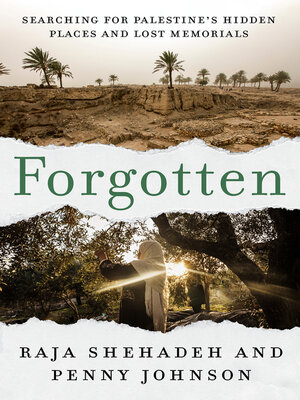
Sign up to save your library
With an OverDrive account, you can save your favorite libraries for at-a-glance information about availability. Find out more about OverDrive accounts.
Find this title in Libby, the library reading app by OverDrive.



Search for a digital library with this title
Title found at these libraries:
| Library Name | Distance |
|---|---|
| Loading... |
A profound meditation on memory and the preservation of Palestinian heritage, from the award-winning author of We Could Have Been Friends, My Father and I.
Forgotten uncovers the hidden or neglected memorials and places in historic Palestine—now Israel and the Occupied Palestinian Territories—and what they might tell us about the land and the people who live on the small slip of earth between the Mediterranean Sea and the Jordan River.
From ancient city ruins to the Nabi 'Ukkasha mosque and tomb, acclaimed writers and researchers Raja Shehadeh and Penny Johnson ask: what has been memorialized, and what lies unseen, abandoned, or erased—and why? Whether standing on a high cliff overlooking Lebanon or at the lowest land-based elevation on earth at the Dead Sea, they explore lost connections in a fragmented land.
In elegiac, elegant prose, Shehadeh and Johnson grapple not only with questions of Israeli resistance to acknowledging the Nakba—the 1948 catastrophe for Palestinians—but also with the complicated history of Palestinian commemoration today.
Forgotten uncovers the hidden or neglected memorials and places in historic Palestine—now Israel and the Occupied Palestinian Territories—and what they might tell us about the land and the people who live on the small slip of earth between the Mediterranean Sea and the Jordan River.
From ancient city ruins to the Nabi 'Ukkasha mosque and tomb, acclaimed writers and researchers Raja Shehadeh and Penny Johnson ask: what has been memorialized, and what lies unseen, abandoned, or erased—and why? Whether standing on a high cliff overlooking Lebanon or at the lowest land-based elevation on earth at the Dead Sea, they explore lost connections in a fragmented land.
In elegiac, elegant prose, Shehadeh and Johnson grapple not only with questions of Israeli resistance to acknowledging the Nakba—the 1948 catastrophe for Palestinians—but also with the complicated history of Palestinian commemoration today.







